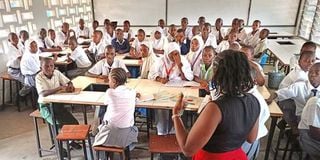All you need to know about Knec Grade 9 assessment pilot starting on Monday

Junior secondary school learners are taken through a science lesson inside a lab at Bomu Primary School in Changamwe, Mombasa County, in January this year.
The Kenya National Examination Council (Knec) will pilot the Grade 9 Kenya Junior School Education Assessment between 15 and 19 July 2024 with 5,875 learners currently in Grade 8 in 235 schools.
The pilot aims to assess the readiness of both learners and the education system for the full implementation of the Kenya Junior School Education Assessment (KJSEA) and prepare for the summative assessment in 2025, which will mark the transition of the Competency-Based Curriculum (CBC) to senior high school.
“Assessment outcomes from both formative and summative assessments shall contribute to final reporting at the end of Grade 9 in readiness for placement in Senior School for learners in the Age Based pathway, and transition to the Vocational Level for learners in the Stage Based pathway,” said Knec CEO David Njengere during a press briefing.
He further noted that the KNEC will assess the feasibility of the proposed national assessment and verify the validity and reliability of the testing instruments and other critical procedures.
Consequently, the Grade 9 Summative Assessment will be conducted to determine the appropriateness of the specification tables developed for each Grade 9 subject, to determine the appropriateness of the test items/tasks in each subject, and to assess the validity, reliability and effectiveness of the assessment instruments in determining the competency levels of learners.
“The pilot will help find out the effectiveness of the procedures of administering the Summative Assessment at Grade 9 and also establish readiness of using e assessment in Junior schools while determining the appropriateness of the time allocated for the assessment and establish the effect of using various formats of test items,” he said.
The assessment will replace the Kenya Certificate of Primary Education (KCPE) examinations, the last edition of which was conducted last year.
Kenya Junior School Education Assessment
In the new system, the assessment will be called the Kenya Junior School Education Assessment (KJSEA) and will be calculated as follows: 20 per cent from the Kenya Primary School Education Assessment at the end of Grade Six, 20 per cent from school-based assessments in Grades Seven and Eight, and 60 per cent from the Grade Nine summative assessment.
“We aim to determine the reliability of the scoring procedures, assess the suitability of the criteria for grading assessments at Grade 9 in guiding placement in senior school, find out the most suitable styles of reporting assessment results, and use the lessons learnt to plan for the national roll out of the KJSEA at Grade 9,” he said.
The KNEC chief further noted that they aim to disseminate the necessary tools to assess the effectiveness of students and ensure their readiness.
The summative assessment papers, formerly known as examination papers, will be given to five schools in each of the 47 counties, a total of 235 schools.
These papers will serve as samples for candidates preparing for the 2025 Junior School Summative Assessments.
“The target population is all learners in Grade 8. A total of 5,875 learners drawn from 235 schools will participate in the pilot. 5,125 learners follow the regular curriculum while 750 have special needs25 learners have been randomly sampled from each of the participating school. In terms of the mode of administration, 30 schools will adopt e-assessment format while 205 will take pen and paper tests.
Further 30 special needs schools have been purposively sampled with representation from the following categories: Visual impairments. Hearing impairments and Physical Disabilities,” he said.
The pilot programme will involve 150 students from the 30 sampled schools. Performance-based tasks will be used in these schools.
“The KNEC officer will take the role of a supervisor, while one of the teachers in the school will be appointed as an assessor,” he said.





